Creating enterprise software is not just about writing code or integrating systems. It’s about crafting a digital ecosystem that helps an organisation run more efficiently, scale faster, and maintain a competitive edge. Whether you’re building a custom CRM, an ERP system, or a company-wide analytics platform, the features you include can make or break your investment.
Today, enterprises demand software solutions that are intuitive, scalable, secure, and adaptable. In this article, we’ll break down the key features that every enterprise software development project should prioritise for maximum business impact.
User-Friendly Interface
First impressions matter — even in enterprise software. A user-friendly interface (UI) and thoughtful user experience (UX) can dramatically reduce the learning curve for employees and improve productivity. Enterprise systems are often complex by nature, but that complexity shouldn’t be reflected in a clunky or confusing interface.
A clean, intuitive UI ensures that users can perform tasks efficiently without needing extensive training. Features such as customizable dashboards, drag-and-drop modules, and search functionalities can further enhance usability. Remember, the best enterprise software hides its complexity behind a seamless interface.
Scalability and Flexibility
In any enterprise software development project, scalability must be baked in from day one. As your organisation grows, your software should be able to handle increased workloads, more users, and additional features without crashing or slowing down.
Equally important is flexibility. Your software should be designed to evolve with your business. This means incorporating a modular architecture that allows you to add, remove, or upgrade features easily. The ability to scale vertically (more power) or horizontally (more instances) is a hallmark of well-built enterprise systems.
Security and Compliance
Security isn’t a feature — it’s a necessity. Enterprise software often handles sensitive customer data, internal documents, and financial records. Therefore, robust security protocols must be a top priority. This includes features like:
-
Multi-factor authentication (MFA)
-
Role-based access control (RBAC)
-
End-to-end encryption
-
Regular security audits
In addition, your software should comply with relevant regulations such as GDPR, HIPAA, or SOX, depending on your industry. Compliance not only protects your organisation from legal consequences but also builds trust with stakeholders.
Integration Capabilities
No enterprise software exists in isolation. Your new system must integrate seamlessly with your current tech stack — CRM, ERP, accounting software, communication tools, and more.
API-first development is a key strategy here. By designing your software with APIs in mind, you ensure that data can flow easily between platforms. Integration also minimises redundancy and improves data accuracy across departments.
Features such as single sign-on (SSO) and unified data formats make it easier for users to navigate across tools without friction.
Customizable Workflows
Every enterprise has its unique set of processes, and your software should reflect that. A rigid platform that forces teams to adapt to the software — rather than the other way around — can create friction and reduce adoption rates.
Customizable workflows allow departments to configure task flows, approval processes, and notifications to match their existing operations. Low-code or no-code interfaces can empower non-technical users to adapt the software to their needs without involving the development team for every small change.
Real-Time Analytics and Reporting
In the age of big data, real-time visibility into operations is a game-changer. Your enterprise software should offer built-in analytics and reporting tools that allow users to track KPIs, generate reports, and make data-driven decisions.
Look for features like:
-
Custom dashboards
-
Scheduled reporting
-
Data visualisation tools
-
Predictive analytics
The ability to extract insights from data helps leadership optimise operations, identify inefficiencies, and forecast future trends.
Mobile Accessibility
Modern enterprises aren’t confined to the office, and neither should your software be. Mobile accessibility allows team members to stay connected and productive while working remotely or on the go.
Whether it’s through a mobile-optimized web portal or a dedicated mobile app, ensure that key functionalities — like approvals, messaging, and data access — are available across devices. Responsive design and secure mobile login are essential features here.
Automation Features
Automation is more than a buzzword; it’s a necessity in today’s fast-paced business environment. Repetitive tasks like data entry, invoice generation, and report scheduling can eat up valuable time and increase the risk of human error.
Including automation features such as:
-
Workflow automation
-
Trigger-based actions
-
Auto-generated alerts and reminders
-
Document generation
…can streamline operations and boost efficiency across departments. The time saved through automation can be redirected to higher-value tasks, driving overall business growth.
Robust Support and Maintenance
Enterprise software isn’t a one-and-done deal. Continuous support, updates, and maintenance are critical for long-term success. Bugs will arise, new security patches will be needed, and business needs will evolve.
Support features should include:
-
In-app help or guided tutorials
-
Access to a knowledgeable support team
-
Detailed documentation
-
Ongoing updates and performance monitoring
Also, consider including feedback loops in the software to gather user input for future improvements. This approach ensures your system evolves with the needs of your users and the business landscape.
Conclusion
Developing enterprise software is a significant investment, and ensuring that it includes the right features can maximise ROI and future-proof your organisation. From a user-friendly interface to robust integration, real-time analytics to mobile access, the capabilities you build into your software determine its long-term effectiveness.
A successful enterprise software development project goes beyond just meeting immediate needs — it anticipates future growth, adapts to changing demands, and supports your organisation every step of the way. By prioritising the key features outlined above, you’ll be well on your way to creating a powerful digital tool that empowers your teams and drives your business forward.
